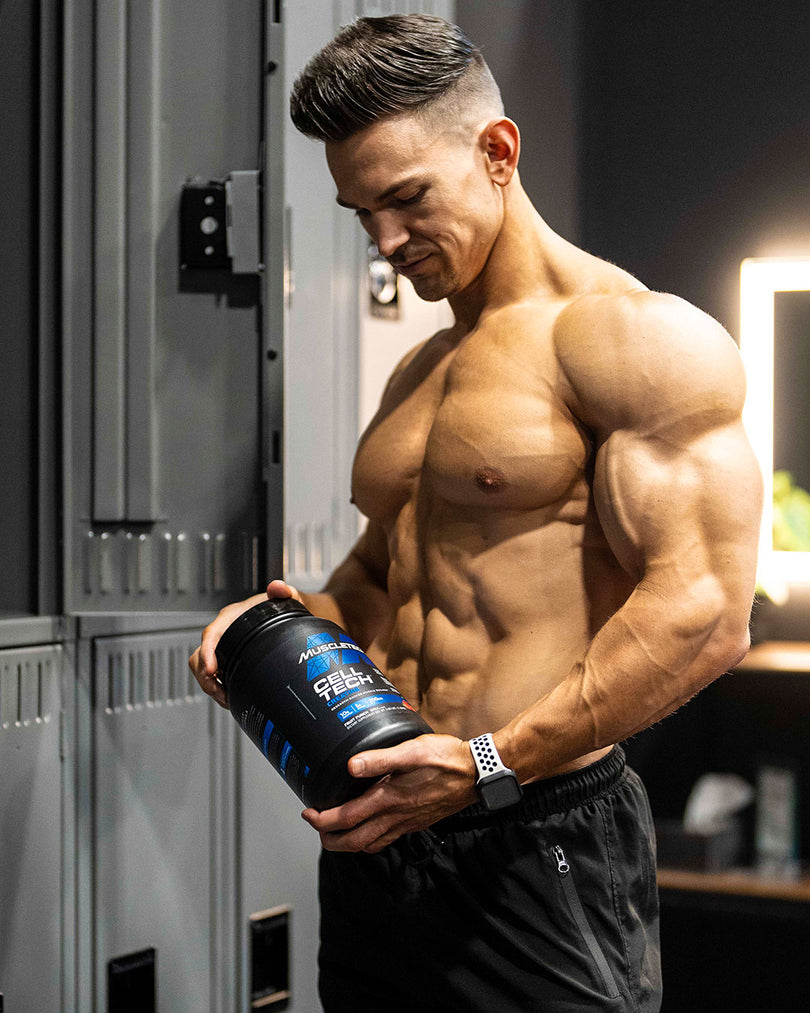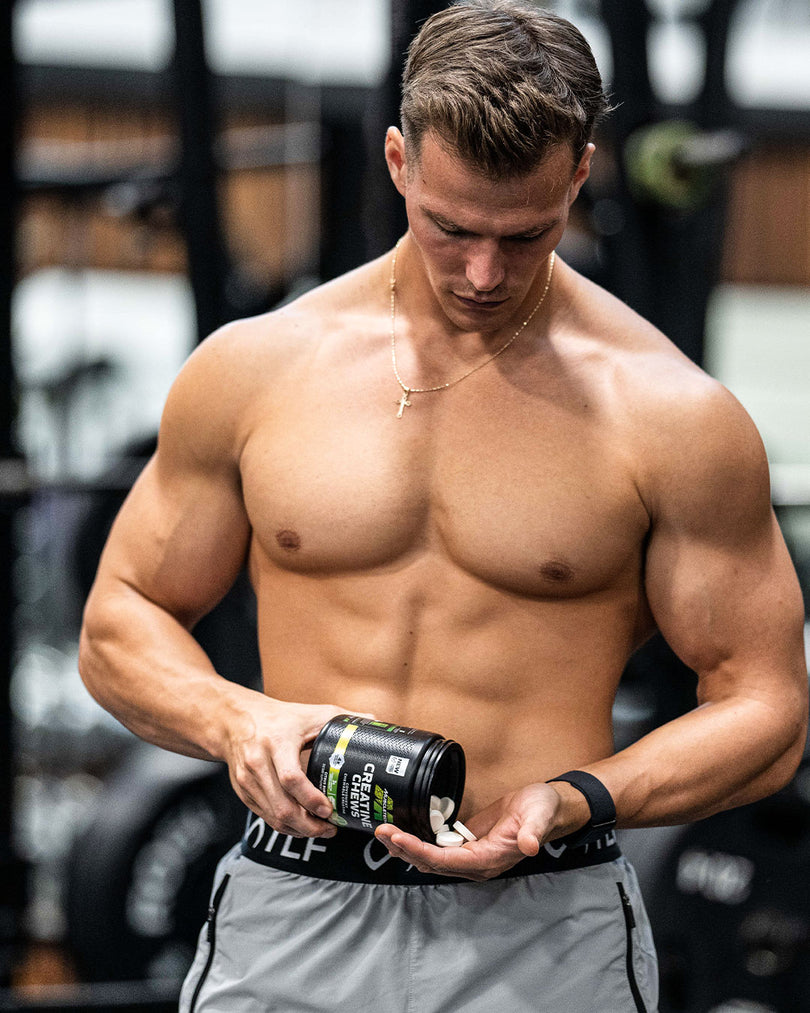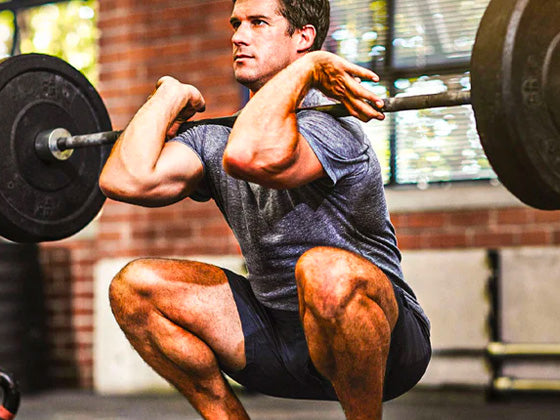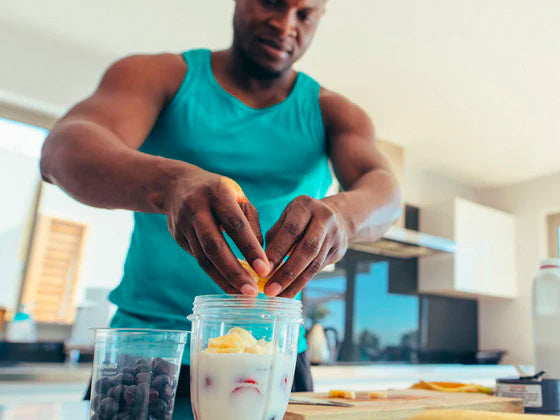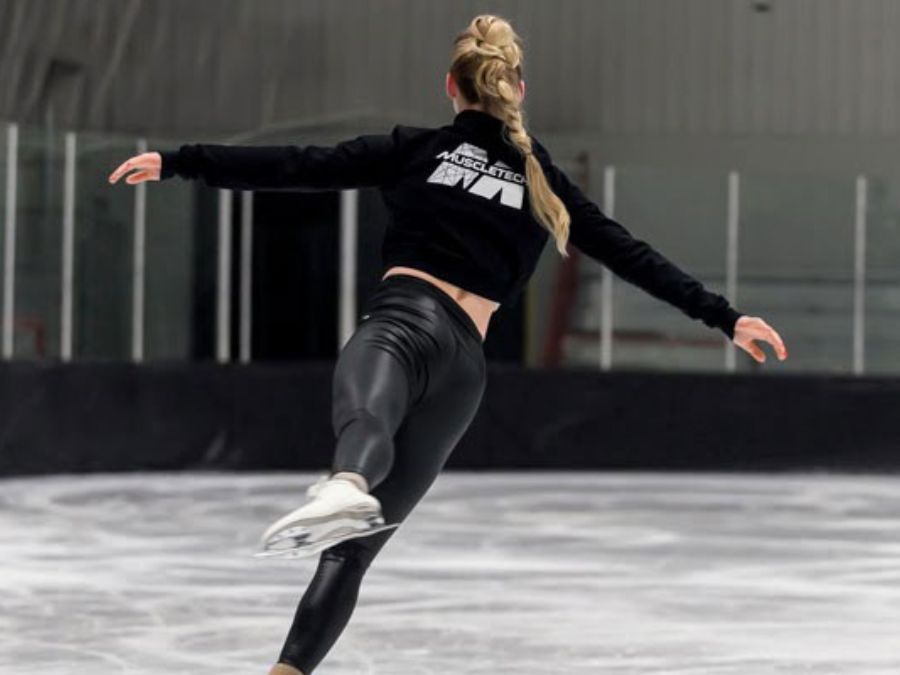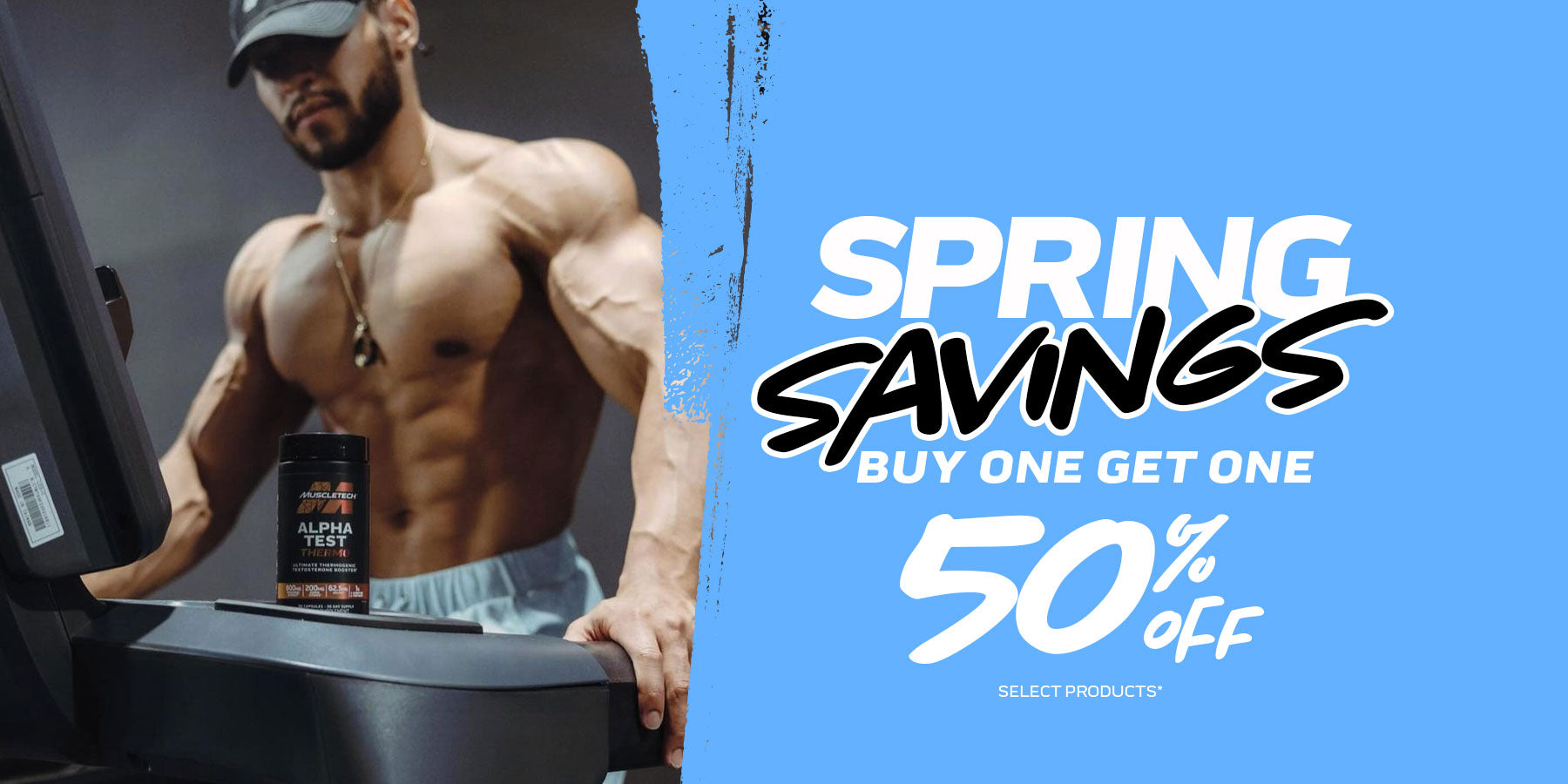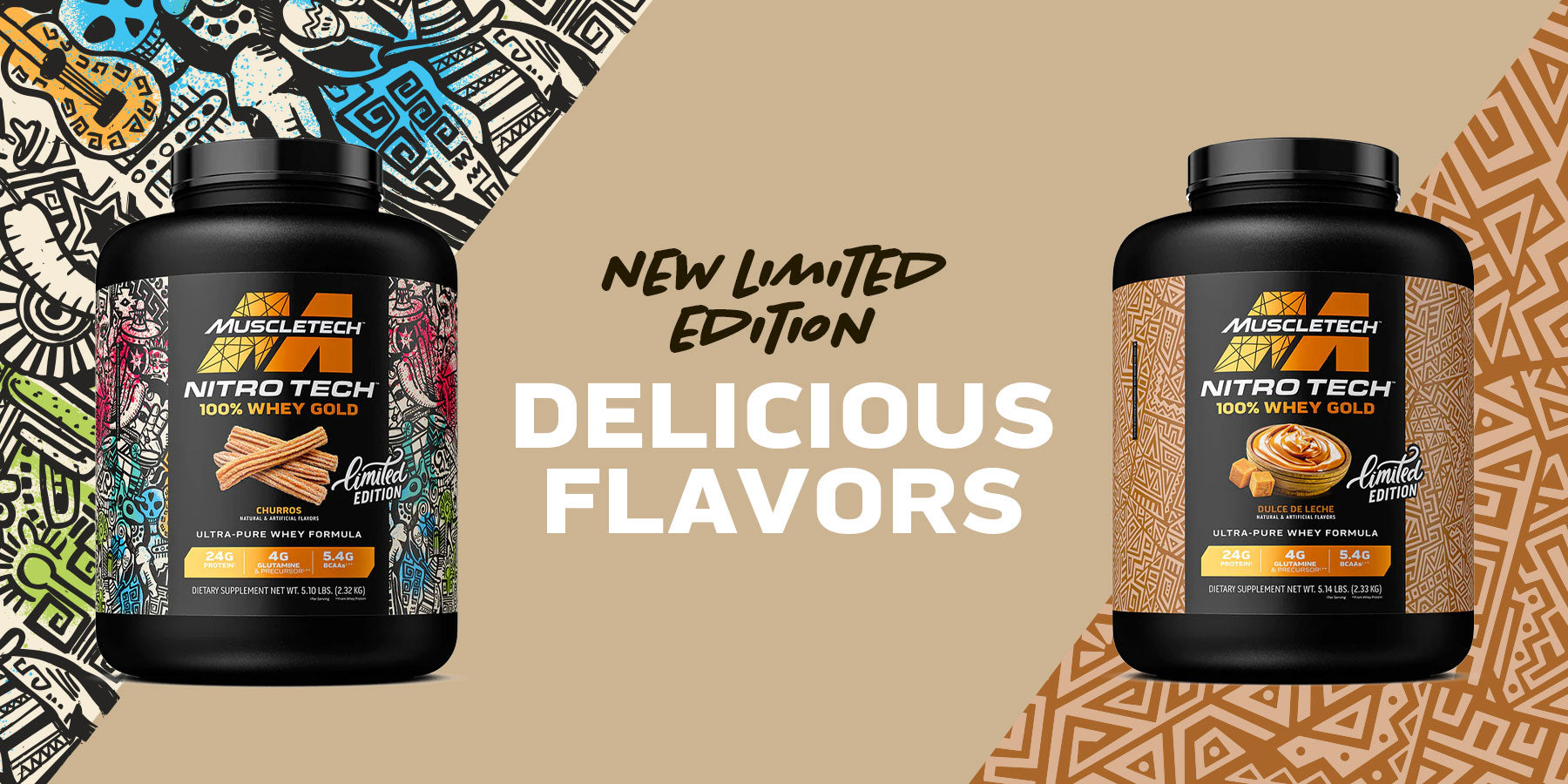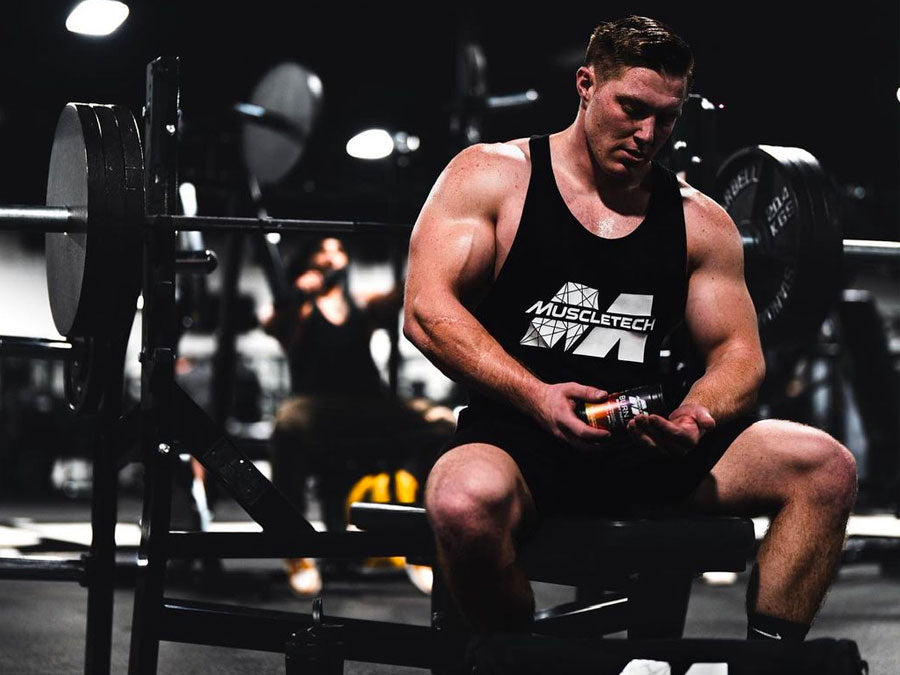Gracie Gold, the American figure skater who is a two-time U.S. national champion and 2014 Olympic bronze medalist, is your newest member of Team MuscleTech. As an 18-year-old phenom, Gold won her first national championship in 2014 and a bronze medal at the Sochi 2014 Olympic Games. Two years later, she took home a second U.S. title and finished first in the short program at that year’s World Figure Skating Championships in Boston. However, while Gold was succeeding on the ice, she was struggling off of it.
Grab Exciting Promotions on Supplements
Gold, who has battled depression, anxiety, and an eating disorder in an extremely competitive sport, took a three-year break at the height of her figure skating career in order to address her mental health. She then made an unprecedented and inspiring comeback to the sport after a three-year hiatus from competition from 2017-2020, receiving a standing ovation at the 2020 U.S. Championships. As Gold continues her comeback and trains for the 2021-22 season, she will be using protein (Nitro-Tech, Iso Whey Clear) and pre-workout (Shatter) products from MuscleTech for fuel.
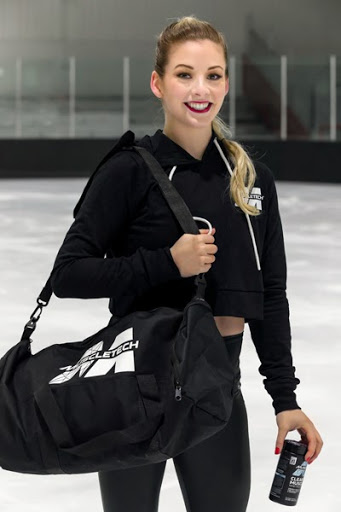
Gold has made it her mission to share her mental health battles with others in an effort to destigmatize mental illness. She will be using her platform and partnership with MuscleTech to further advocate for mental health awareness. She will also be sharing her story of returning to the ice as part of the MuscleTech “Strength Redefined” campaign through video, social media, and written content cultivated for blog.muscletech.com.
Gold, who has always been open, honest, and real about her fight, took time out of her busy schedule to talk with MuscleTech.com about the ups and downs in her figure skating career, how to get back up after you’ve been knocked down, and why the things society tells us are our weak spots are usually where our strength lies.
Q: Gracie, from an athletic standpoint, take us through what a typical training day looks like for you. How much are you on the ice? How much are you off the ice? How many sessions are you going through a day?
A: “During a typical training day in-season, which is usually around August through February or March, I’m on the ice for three sessions a day. So, that’s usually three hours – sometimes a little more, or a little less depending on what my body’s telling me at the time.. I usually workout three to four times a week off the ice, and that’s anything from strength to plyo to just good old fashioned cardio.
Q: When you’re doing up to three sessions a day, how do you manage your day in terms of both taking care of your body and making sure that you’re ready for your next session and what you’re putting into your body?
A: “If I’m skating up to four hours a day, and at least two and a half hours each day, it can be difficult to keep everything going smoothly, so, it’s important that I have enough energy.
With a lot of sports, you never want to feel too full. You also don’t want to feel like you are undernourished. (It’s hard to train with low blood sugar, right?) So, it can be difficult to maintain that balance. I do like having a lot of structure, so when it comes to my day-to-day training, everything is like clockwork. I have my morning coffee and pre-workout before my first session. Then I have a snack before my second session, and sometimes another coffee or maybe another bit of pre-workout before that third session. Then usually on the way home is when I’ll have a protein shake so I can have something in my body to keep it going throughout the whole day, especially if I have off-ice, or any kind of off-ice training later that day. I’m going to want to keep everything going.
But it can be tricky, especially when you’re out there doing triples. During long programs, we’re bending this way, this way, and this way (gesturing). You know, it takes a lot to do that. But like I said, you don’t want that feeling of being too full.”
Q: When did you start to become aware of supplements and start incorporating them into your daily routine?
A: “As things continue progressing in your skating career, you start looking for ways to improve your performance on the ice. Coaches will recommend things like off-ice for strength. There’s physical therapy for dealing with injuries and recovery. Then there’s nutrition, which is something I’ve learned is more important with age.
In many cases, when children or young adults participate at an elite level in any sport, they’re not always known for choosing the best snacks, or the things that are best for their body. Then as you get older, you want to stay injury free, and it’s harder to neglect how simple decisions like what we put into our body impact how we feel.
You know, I’m not 14 anymore so I can’t just go lace up my skates and go do triple-triples. And I want my body to feel absolutely the best it can be on a daily basis. So, I started looking into things that could help my performance. And supplements, anything from amino acids to protein powders to pre-workouts, staying hydrated, you know all of these little things that don’t seem like that big of a deal, but they can have a huge impact.

Q: On that note, we know that you have a sweet tooth and that you love your coffee. At what point are you balancing, ‘Do I have another cup of coffee and throw a bunch of creamer and caramel sweeteners into it?’ versus going to a pre-workout? As someone who still has both, what’s that internal debate like for you? Have you started to look at pre-workout as a substitute for coffee?
A: “Yeah, I definitely have a sweet tooth and I definitely am a coffee lover. But how many caramel lattes can you have in a day before it’s too many? My favorite cup of coffee is that first one in the morning, just that sense of warmth and comfort. It’s how I have started my day since I was young.
But sometimes in the afternoon, especially in the summer when it’s really hot and I’m doing outdoor cardio, I need a little boost of something, but I’m not reaching a white chocolate mocha. Incorporating pre-workout has been a great way to kind of streamline all the good things that a cup of coffee can give me, but without any of the extra sugar, and the $5 drinks.
And yeah, a sweet tooth can lead me astray. So, pre-workout has been great, especially for those afternoon sessions right before evening workouts, and in the morning, too. Sometimes I will find myself skipping that cup of coffee, especially in the summer on the east coast when it’s really humid and it’s already really hot. You know, I just want my pre-workout over ice so I’m ready to hit the ice.”
Q: You’ve said that you like the Nitro-Tech Elite Belgian Chocolate Ice Cream flavor because it satisfies your sweet tooth. What has your experience been like with Nitro-Tech protein powder?
A: “So, with the Nitro-Tech protein powder, again, sweet tooth (smiling) – sweet over savory, over salty any day of the week. Sometimes, of course, I do treat myself and I do have a real bite of chocolate. But you know, it doesn’t really serve my body from a nutritional standpoint. So, having a really rich, chocolatey protein drink can kind of curb that sweet tooth and really satisfy my cravings, while treating my body well.”
Q: So, our audience is not necessarily a huge figure skating audience. What misconceptions do you think people have about skaters as athletes? You put in a ton of time, a ton of effort, and a ton of work. Talking to an outsider, how would you explain to them the reasons why skaters are elite athletes?
A: “Yeah, I find that the general public just doesn’t know a lot about figure skating. It’s not a sport that you do an hour a few times a week. It’s not just throwing on your skates, putting on an outfit, and doing some jumps. People who are skaters and compete at an elite level typically start skating at a very young age — two, three, four, maybe even five years old. By comparison, I started when I was eight and many consider that to be on the older side.
The shelf life of a skater is a lot shorter than other sports. Most retire before athletes in other sports like baseball, basketball and football go professional. And taking time off doesn’t really happen unless it’s for an injury.
The work that we put into it – you’re on the ice three to four hours Monday through Friday, and a little bit on the weekends. We’re lifting our own body weight, and we need to be able to rotate three times in the air – three times in a short, seven times in a long. It’s quick-twitch – so you have to be quick and you have to be light, but you have to be strong and have endurance, but also be able to go from zero to sixty as fast as you can. It requires a lot.
This can all be really hard on the body. You’re either on-ice, in the gym or in the PT office. It’s not really the fairy tale, delicate misconception that I think people have of our sport.
We train so hard so that we make it look that easy and delicate, but it’s really not.”
Q: How do you train to be strong and yet light? Are you working your lower-body and upper-body? Are you lifting weights? How do you find that balance?
A: “I find that when it comes to training for figure skating, there’s a very fine line between doing enough, without doing too much in really any aspect of it. It’s a lot of lower-body, a lot of core, a lot of quick-twitch reaction, and a lot of plyometrics. So, you want to be strong enough so you can make it through the end of a program with power, but that’s as much strength as you need. You don’t need any extra because, even muscle, that’s extra weight that you’re carrying through four minutes and ten seconds. So, it can’t be too much. But if we’re too weak, and we’re just kind of too wiry, then we won’t have that strength and that power.
But it’s also skater dependent. I’m more of a power skater so I always am a little bit stronger maybe than most of the field. But I have to work on being quick, and on my endurance. So, I love lifting weights and I love doing sprinting and plyo, but there’s a limit. I don’t do a lot of leg days in-season. I kind of stick to low-impact cardio and a lot of plyometrics, especially during competition season. You’re really just trying to keep everything going smoothly. We make a lot of our progress and changes in the off-season.”
Q: It sounds like your whole mindset is focused on doing your on-ice performance during on-season. So, is there less of an emphasis on getting gym time in during on-season?
A: “For most people, and for me, as well, yes. If we’re a week or a week-and-a-half out of an event, we might taper a little bit off the ice because you’re not going to make that much progress in a week. It’s really just doing what you’ve already trained. Our whole sport is repetition. If you boil it down to one thing, it would be repetition.”
Q: As an athlete, you’re taught that weakness is a negative thing. But the reality is that everyone comes to a point where they realize what their weaknesses are and they start to channel them accordingly. So, how important is it for an athlete to understand you’re not invincible, you’re not perfect, but your weakness can become your strength? Tell us about how you found yourself coming to that point.
A: “I think that, especially in Olympic sports, Olympians are seen as superheroes. If we literally think of Superman, kryptonite is the only weakness we could really name. Other than that? Invincible. So, Olympians being seen as superheroes, any kind of mistake, misstep, or flaw is almost glaringly obvious as opposed to just a regular athlete, or just a regular person in everyday life. And, of course, it’s amplified on the world stage with millions of people who don’t know your story. They haven’t been with you day-to-day. They’re seeing you for a very short time on their TV representing their country. And one mistake feels like the end of the world.
We as a society have kind of been conditioned to push any kind of weakness, any character flaws down. We’re told to keep those in the closet, in-house. One of the reasons I chose to share when I found some of my weak spots in my own life, and in particular in my mental health, they weren’t seen as a weakness for me because it’s just part of the human condition. No one’s immune to feelings of depression, to feelings of anxiety, to the feeling of when you’re knocked down and you feel like life has given you a bad hand. You know, that’s a universal experience.
For me, it wasn’t a weakness at all. But it was just showing, if anything, some of my strengths, which were how to persevere and how to acknowledge, ‘Yes, these things happened. And these are maybe where society has told us these are our weak spots, but often times that’s where our strength lies.’”

Q: When you’re knocked down, how do you get up? What was the process of getting up like for you?
A: “After I got help, and I was discharged from a mental health facility, I didn’t know exactly what to do, but I didn’t feel like I needed to know either. I was thinking, ‘This is just part of the journey.’ And I was just kind of seeing where things went. Of course, that brought me back to an ice rink where I’ve essentially grown up.
I started coaching, and then I started skating around a little bit because I missed skating. You know, it’s something I’ve done my entire life. And I feel like anyone who has done any sport, or anything for that long (from age eight) knows the concept of coming back to something you’ve invested that much time and effort in. When I went to get help, it wasn’t my intention to retire and never put skates on again. I just knew that at that moment I needed to take a break from my life in general, including skating.
Skating didn’t let me down, or damage me. I wasn’t ready to be an elite athlete, or an athlete in general. I needed to fix what was going on in here (motioning to her head) before I could see what this could do (gesturing toward her body). I just stepped away from skating. And I feel like it wasn’t necessarily my choice. Like, I didn’t part ways with it as peacefully as I had envisioned myself one day stepping away. So, when I found my way back to the rink, and got back into skating, competition wasn’t even my main goal. It was falling back in love with something I’ve done my whole life. It was like meeting up with an old friend again for coffee.
And I just missed skating. I missed doing that. And I missed working out. I missed being in the gym. You know, all these things that were so good for me that kind of became toxic. So, it was important for me to heal that relationship. You know, it wasn’t an eating disorder; it wasn’t food’s fault. It wasn’t the gym’s fault. It wasn’t skating’s fault that these things had happened. It was almost everything around those and how I handled some of the cards that life dealt me. And I blamed it on skating, and the pressure. So, coming back to it, it was like coming back home in a way.
Then I kind of realized that I still might have what it took to compete again. And you know, I guess that’s just how you get back up. You just put one foot in front of the other. Keep going, keep going, keep going, and almost how skating started for me – just one foot in front of the other. The snowball effect.”
Q: So, the intention was never to come back and compete again? It kind of sounds like it just happened and was this progressive – step one, step two, step three. It seems like you have understood how to manage your good days and your bad days.
A: “My original goal wasn’t to compete again because it didn’t really seem possible. And most people didn’t think it was possible. Now, I’m sure after my first nationals back in January of 2020, standing ovation, lots of tweets said, ‘We knew you could do it.’ But that’s not really the feedback I got when I first laced up my skates again. But that’s okay because, again in skating, it’s not a sport where you just take time off. Your body completely changes to the point where you can’t just hop on a treadmill, throw on your skates and come back to the top. Most people, if they end up taking that much time off don’t come back to the sport competitively and there’s a reason for that.
So, I didn’t put any pressure on myself originally to compete because I never even started skating as a child to go to the Olympics. You know, I started skating because I really liked skating. And then I wanted to skate more, and more, and more. And then I had my first competition, and then my second, and then my third. It was always just one step at a time. Because if you look at it from a macro view of all the things you have to do from the moment I laced up my skates to being back at the Olympics, that’s so much. That’s so many steps, and different contingencies. So, I was just like, ‘Okay, what can I do this week?” towards that goal. What does this week look like? Or what does this month, and then this week, and then today look like? You know, just break it down into bite-sized pieces.”
Q: You’ve talked about athletes not knowing what their next step is after their journey has come to a close, or come to a pause. So, now that you’ve been away and you’ve come back are your goals different? Do you now look at the endgame and see it completely differently than you did before you left?
A: “I feel like when you do something, whatever it is, from six, seven, eight-years-old into your twenties, it’s hard to part ways with that. You’ve done it every single day for as long as you’ve been alive essentially. And it can feel at times like, ‘What’s outside of this?’
And I know I was a figure skater, I was an athlete, I was an Olympian, and I was a National Champion. You know, those were kind of my identifiers. So, it was interesting to step away and realize, ‘Oh, I’ll be okay.’ Like there are more things. There’s no need to pigeonhole myself into just the box of like, ‘Gracie Gold: The Olympic figure skater’ because life does go on.
But coming back to it, I realized that it was still an important facet of who I am and of my life. So, I’m not just ‘Gracie Gold: The Olympic Figure Skater.’ I’m so many more things. But skating has been a bigger part of my life than most people have. To come back to it was really beautiful. And I just wanted to come back to it in any capacity that I could. But I am a competitor. And I just like to push things, and I just like to do the most. So, it was, ‘Oh, I’m just going to get some jumps back.’ Then it was, ‘Oh, can I get all my triples back?’ You know, ‘How much can I squat again? How fast can my new mile time be?’ And then I found myself at nationals again.” (Laughing)
Q: How important has it been to find your voice and speak to not only members of the skating community, but also to other athletes about your experiences?
A: “Speaking about my experiences has been really liberating and empowering. Speaking with other elite athletes has been wonderful because sometimes, especially when you’re struggling, it can feel like it’s just you. And skating is one those sports, like others, where it’s not a team sport. So, it’s always just you. It’s just you on the ice. It’s just you at practice. And through the highs and the lows it can feel like it’s just you. So, to connect with other athletes over the highs and the lows, and realize that we all have so much more in common than we think has been really incredible to develop that network of support.”
Q: Gracie, what is strength in your mind, especially having gone through what you’ve gone through and being where you’re at right now?
A: “I think strength, and being strong, can look different on everyone, and it has a lot of different meanings. But for me, being strong it’s when you’re afraid, when you’re knocked down, when things are not going your way, and it kind of feels like the walls are caving in, it’s just waiting out the storm. It’s surviving despite everything in life that’s trying to push you down because the sun will shine on us again eventually.
So, being strong sometimes looks like doing that last session. Hitting the gym on Friday evening when I could be doing something else. After a bad competition, getting back up and going back out there again despite previous mistakes. But sometimes it looks like stepping away. When I had to take time off to address my mental health issues, and my life kind of spiraling out of control, it was strength to step away to kind of run away and fix everything else. Strength looks like coming back to skating in a way. I guess it’s that grit. And to be able to push through something, or to keep moving forward, when people’s situations, or just life, is trying to hold you back. It’s strength to get back up.”
Q: Your experiences are interesting because they’ve happened in the social media age. And while authenticity has become more in vogue, many social media posts are still very curated. How has social media made life either more fun or more challenging for athletes? Does it create more pressure and more problems? Where do you stand on social media in general?
A: “Social media has some good things and some bad things as most things do. It can be really problematic as I think we’ve all seen, but it can have some really beautiful moments, too. As far as staying in contact, or meeting other athletes of any age level or sport, to be able to connect with them – sometimes I’ll read my direct messages and they’re filled with beautiful messages from people from all over the world who want to share their story or talk about mine.
But what you see on your feed is curated. It’s the best moments, or just specific moments, chosen out of someone’s life. And if you just based someone off of their social media, you’re really only seeing a small piece of their life and their story. And growing up, especially during the rise of Instagram and Snapchat, and just seeing the highlight reel and comparing yourself to someone else’s highlight reel is difficult. If someone’s posting a photo in the gym or of this jump that they just landed, you know, if I wasn’t having a good day and I see their highlight reel, it’s just that judging and comparing that goes on.
It’s curated, and there has been a rise of authenticity and being more real and more vulnerable. You know, the kind of fake Barbie doll facade isn’t – it was never real in the first place, and people want people to be real, especially in hard times like we’re facing. It’s a double-edged sword though. It can be highly problematic – that’s what I’ll say about social media.”
Q: So, the Barbie doll example is very interesting because your last name is literally Gold, you have blonde hair, and that was very much your image seven or eight years ago. So, who is the real Gracie Gold? What is the real Gracie Gold like?
A: “So, kind of the original Gracie Gold image was your very All-American red-lipped, blue dress – like, I looked like Elsa from Frozen. I looked very much like a Barbie doll and I said all the right things. I was good with media, and that was really authentic for a short time when I saw 16, 17, kind of turning 18. Those things kind of did fit my image and I was like that in some ways. But then as I was growing up, and the things that you think back to when you were 16 versus when you were 21 versus when you were 25, you know people grow and people change, and they should. It would be weird if I were still just like 16-year-old Gracie almost 10 years later.
It was hard for a while when I felt like I wanted to change. I felt like there was some pushback because of my image and because it didn’t really fit the Gracie Gold mold. I remember even at the time wondering what that meant because I was like, ‘Oh, I’m Gracie Gold. That mold is whatever I am.’
As for things that people wouldn’t expect, I’m definitely more of a tomboy than people think. Oftentimes people will see me dolled up with big blonde curls or a tight bun, but day-to-day I’m much more of a tomboy. I’m much more comfortable with my hair in a messy bun and just some comfortable sweats. I love true crime, which is kind of a dark interest, I suppose. I have a very dark, very sarcastic sense of humor, which some people like, some people don’t. I’m not everyone’s cup of tea, but I’m okay with that. Sometimes you have to have the courage to be disliked, which I certainly have.” (Smiling)
Q: What’s your advice to younger athletes who feel like they’re under pressure to perform in an athletic setting? You’ve experienced the pressure of feeling like you have to be perfect all the time and you’ve also seen the benefits of doing what you need to do in order to be great on a given day. So, what would your advice be to athletes about managing their own hopes and desires versus what’s really okay?
A: “I would tell up-and-coming athletes, or I would have even told my younger self, that the pressure to be perfect can feel overwhelming at times, but when you feel pressure it does mean you’re on the right track in some ways. The pressure will be more intense, especially when you make that jump from ‘I’m just doing this for fun’ recreationally to elite, to making the Olympics. That does require a specific result and specific qualification. And it’s okay to want a specific result, but you can’t put everything on that.
If your entire well-being hinges on one placement that can be detrimental because there are a lot of things, some sports more than others, that are out of your hands. It’s okay to want that. It’s okay to want to be your version of perfect. And the pressure to do well isn’t always a bad thing, but I always say go with your gut. If you want to do something, and if you want to make a change, step away and redefine yourself. That’s one, if someone is pressuring you not to, or to stay the way you were and stay with what’s comfortable, you know it’s called a comfort zone for a reason. It’s comfortable, but not a lot of growth happens there, not a lot of innovation, not a lot of new things, but again, if you want to stay in your comfort zone that’s also okay.
I also wish that I had defined what my version of perfect was. It’s okay to expect things of yourself, but again, to hinge your entire well-being on it? There’s no need. In any sport, whether it’s skating or swimming, there are things that are out of your control, and sometimes things just don’t go the way that you want. But it’s okay to want a result specifically. That was one that I was told over and over again, ‘Oh, you can’t focus on the result. We’re just doing our best.’ Yeah, okay. But you also work very hard and you can want things for yourself. You can have high expectations of yourself. But if they’re too high, and if you don’t meet them the world is ending – that’s too much. You’re not going to be able to keep it up. That’s such a volatile way to live. And if everything, even outside of your sport or whatever you’re pursuing in life, if nothing matters except for that one gold medal – okay, want it a little less than that. But it’s still okay to want that.
Pressure is not always a bad thing, but focus on managing it. And I always recommend finding at least one or two people to keep you sane. One or two people who aren’t relevant to the placement. I always had my twin sister. Win or lose, the best or worst, skater or not a skater that had no impact on our relationship, and how important it was to her. She was a great person to bounce things off. So, I recommend finding even just one or two people outside of your sport, outside of your craft – whatever you’re doing – that keep you in check. Sometimes my sister would tell me like, ‘Gracie, just so you know, if you don’t win, second place, or third, or any place is okay.’ She could tell me, ‘Perfectionism is getting a little detrimental. Let’s bring it back.’
So, find your people, manage your expectations, but it’s okay to pursue perfection as long as you know that it doesn’t really exist, and you might not quite reach it. But pursue excellence, pursue being good, and have expectations for yourself. That’s what makes the best – The Best. Again, inside your comfort zone really great things can happen, but there’s a limit to that.”
Q: What was your reaction to placing fourth in the individual event at the 2014 Olympics?
A: “So, placing fourth in the individual event at the Olympics was amazing. I actually didn’t take it that hard at first, but it was a little bit more challenging a few months after. But I was ecstatic because I was second in my segment of the team event and we were third overall. And I was kind of an unexpected not just Top 5, but Top 4 at the Olympics. A few months before, a huge majority of figure skating fans in particular didn’t think I would make the team, and then to be fourth…
But after it was difficult. A lot of people, their first comment was, ‘Oh, you’re fourth? You were so close to third.’ It’s almost as if I was fifth it would’ve been easier. But there’s something about fourth – there was a lot of outside feedback of, ‘Oh, you were so close.’ I was like, ‘A few months before you guys didn’t even think I was going to make it. Now we’re disappointed that I wasn’t one spot higher?’ I thought that I did super well. I was hoping for Top 6 to 8 like at best-case scenario, but even to be Top 10 at the Olympics first go-round is kind of pretty good. There were a lot of veterans that were skating. There were a lot of expected medalists.
And then a couple of months after, I was like, ‘Well, how close was I? Did I just not dream big enough?’ Then there was all of this internal guessing. But there’s something about being fourth that people can’t help but say, ‘Oh, you were so close.’ Yeah, I know. Like, anyone who has ever gotten fourth at any big event is aware that that number comes immediately after third, which is a medalist.
Overall, when I look back at the Olympics, and even while I was there, I was thrilled. I was the highest placing U.S. lady. Then I placed second in the team event and we got the bronze. And then to skate two really great programs to be fourth in the world. I mean, amazing. I look back at it with no regrets.”
Q: So, when you’re looking at partnerships now, when you’re looking at what happens next – whether it’s going to another Olympics or becoming a voice for athletes who have been through this experience or had difficulties – how important is authenticity in that partnership? How important is it to feel like there’s an investment in Gracie Gold the person?
A: “I think my whole life I’ve always been a fan of being real, being honest, being transparent, and authentic. Growing up, and even now, people were like, ‘You’re very blunt. You’re very forward. And you just say what is happening.’ And I’m like, ‘Yeah.’ Unless it’s a very delicate topic, I think let’s just say what it is.
Sometimes with sponsors or partnerships and the Olympics, it can feel like a conveyor belt in the way that it’s like we need you for this period of time, you’re super important to us, and then you’re gone. Or if you don’t deliver, then you’re gone. And it’s like you didn’t exist. And now, I’ve said before, if we led with that – like, ‘We are here to support you for this amount of time, and this is what we expect from you. If you don’t, this is what will happen.’ Great. Let’s be forthcoming about it. But sometimes I find it’s like a revolving door. You go out, someone else comes back in to take your spot.
So, it’s really important to me, and really every aspect of my life, to just be around real, authentic, honest, transparent, and vulnerable people. I just have never taken an interest in especially fake or false niceties. I feel like the world doesn’t need it anymore. I don’t need it anymore. And just being real is a trait that’s very important to me across all aspects of my life.”
Q: You were as blunt as probably any athlete has ever been when discussing some of your mental health issues including suicide and suicidal thoughts. What goes into being that blunt and having that little of a filter? Is it self-confidence, is it not caring, or is it the strength to be able to say what’s on your mind? What goes into being that blunt about some very, very serious subjects?
A: “I guess it’s strange because I never saw my honesty about my mental health issues, or what they were like, I never saw it as being blunt. When someone would ask, ‘Oh, you went to a rehab facility, a mental health facility for what?’ I would just tell them. It would never occur to me to dance around it, or to lie, or to leave some parts out unless I was working with kids – or maybe a kid had asked, or there were children present in which case that would be the only reason. But certainly talking to other athletes, or other adults, anyone – as long as I felt it was age appropriate, I think it just never occurred to me to not say the truth. And I feel like if anyone were to judge me or criticize me harshly for being honest it just tells me everything I need to know about them.”
Q: What motivates you these days? What gets you out of bed in the morning?
A: “What gets me out of bed in the morning, it depends on the day, but I always try to look for something exciting about my day just in general. And I always have various projects, or ideas, or things that I want to try whether it’s on the ice or off the ice. And usually the hardest part of anything is starting. The hardest part of a workout, of a program, or of an interview typically is just starting. Once you do put one foot in front of the other, once you do kind of get momentum then all of a sudden it’s the end of the day and you’re thinking, ‘Oh, what am I going to have for dinner?’
If nothing else, I’m just curious or hopeful about the day because there’s kind of a misconception that you have to be excited about what’s to come. But a lot of times if you are just curious or hopeful that’s more than enough. It’s an unrealistic expectation to be really excited every single day that you wake up.
Sometimes it’s not all good things – like the day that you have to go to a funeral. It would be weird to wake up and be excited about that day. You can be hopeful that it goes as smooth as it can. You can be hopeful that it’s a beautiful service. And sometimes you don’t have to jump out of bed. But as I said, I’m at least hopeful that something nice, or lovely, or at least interesting will happen that day. So far, it certainly has. There are not a lot of dull days in my life.” (Smiling)
Q: Who motivates you? Is there someone you look up to?
A: “A lot of people inspire me both on and off the ice. Even on the ice, I could never pick just one skater or one athlete. It sounds lame, or like a Hallmark commercial, but my mother has always inspired me because she really is one of the most metal women you will ever meet. I always say she’s whiskey in a teacup. And God put her in the cutest little package. She is five-foot, blonde bob cut, big blue eyes, but she is absolutely one of the fiercest, really inspiring women in a long time.
She recently had to go back to work. She was an ER nurse her whole life until she had us, and then she kind of turned into a stay-at-home mom and then into a skating mom. She recently went back to work, of course then the pandemic struck, and she is pulling night shifts in the ER during the COVID-19 pandemic.
One of my favorite stories about my mother… A lot of psych patients come through her ER, and I called my mom up one day to chit-chat and she was complaining about all this paperwork. I said, ‘What’s the paperwork for?’ She’s like, ‘Ugh, this patient. I got roundhouse kicked in the head the other day.’ (Making a shocked face) She said, ‘And the paperwork for it is –’ I cut her off and said, ‘What? Mom, are you okay?’ Again, she’s quite a small human, and a grown man psych patient just attacked her, and her biggest concern was the paperwork, and just that she was fine and didn’t need it. She just is always so tough and strong. You want to talk about someone who’s strong and overcomes? She has the ability to persevere through literally anything. On the ice, off the ice, or in general, if I can even be close to the badass she is that would be great.” (Smiling)

